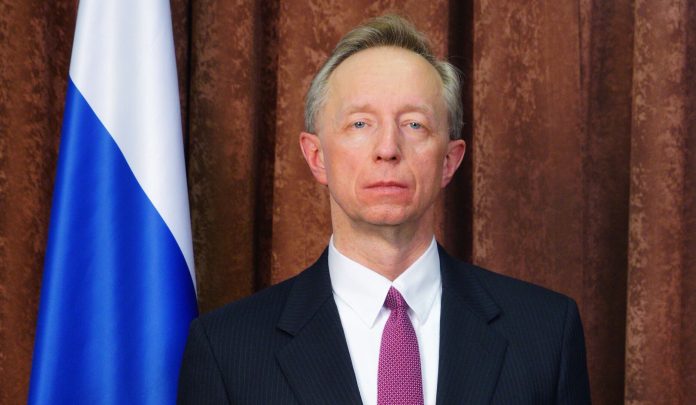In an interview with the Russian media outlet RVTI, Deputy Foreign Minister Mikhail Galuzin laid out conditions that Russia would find suitable for peace in Ukraine:
- “Cessation of hostilities by Ukrainian armed groups and the supply of weapons by Western countries, as well as the withdrawal of foreign mercenaries”
- Neutral and non-aligned status of Ukraine in regards to NATO and the EU
- Nuclear-free status of Ukraine
- Recognition by Kiev and the international community of “new territorial realities,” such as Russian annexation of Crimea, Donetsk, Luhansk, Zaporizhzhia, and Kherson
- “Demilitarization and denazification of Ukraine”
- “Protection of the rights of Russian-speaking citizens, the Russian language and national minorities”
- Free cross-border movement with Russia
- Lifting of anti-Russian sanctions by Ukraine and the West
- “Withdrawal of claims, the cessation of judicial prosecutions against Russia, its individuals and legal entities”
- Restore the legal framework of Ukraine with Russia and the Commonwealth of Independent States (CIS)
- Restore civil infrastructure “destroyed by the Armed Forces of Ukraine after 2014” at “the expense of the West”
Here are today's control-of-terrain maps of #Russia's invasion of #Ukraine from @TheStudyofWar and @criticalthreats
Interactive map, updated daily: https://t.co/hwgxTnU2Tr
Archive of time-lapse maps, updated monthly: https://t.co/ZabfJTfRkX pic.twitter.com/DknVn2bUzp
— ISW (@TheStudyofWar) March 30, 2023
Looking back at Russia’s previous demands, many of these are old, but some are new. Regardless, Ukraine is not likely willing to oblige to any of them. Back in March 2022, Russia set four main points to end hostilities, which were:
- Ukraine cease their military response to the invasion
- Change Ukraine’s constitution to ensure neutrality in regards to both NATO and the EU
- Recognition of Crimea as Russian territory
- Recognition of Donetsk and Luhansk as independent states
These conditions were set over a year ago and the war is drastically different than it was back then. The three main conditions that have stayed the same are Ukrainian neutrality, nuclear-free status, and recognition of Crimea as Russian territory.
Since last March, Russia has annexed not only Donetsk and Luhansk, but also parts of Zaporizhzhia and Kherson, which has shifted their demands from recognition of independence to recognition of territory that Russia claims as its own. Ukraine has consistently stated that it would not cede any parts of Ukrainian territory to Russia and has pledged to take back Crimea, making these conditions non-negotiable.
Some notable “new” demands are centered around Western reactions towards Russia over the invasion. While Russia has called for the lifting of sanctions since the start of the invasion, it has not previously made its way into peace demands. The same goes for the “withdrawal of claims, the cessation of judicial prosecutions against Russia, its individuals and legal entities,” which comes as the International Criminal Court (ICC) has issued international arrest warrants for Russian President Vladimir Putin and Russian Commissioner for Children’s Rights Maria Alekseyevna Lvova-Belova over the alleged “war crime of unlawful deportation of population (children) and that of unlawful transfer of population (children) from occupied areas of Ukraine to the Russian Federation.”
Likewise, Russia wants the West to pay for restoring and rebuilding parts of Ukraine that have been damaged and destroyed by the Invasion, although they are likely referring to Russian held territory and not Ukraine territory that Russian forces have bombed.
Another interesting addition was demanding that Ukraine restore legal frameworks with Russia and for reintegration into the CIS, which Ukraine has not been a part of since 2018. Russia also called for free border movement. This part is a bit unclear as he didn’t specify which border. Since Russia now considers the Donbas, Kherson, and Zaporizhzhia as Russian territory, it may be interference to the “border” between Russian controlled areas and the rest of Ukraine, which sounds unlikely as the civil war from 2014 up until the invasion saw no free border movement.
Overall, none of these demands will ever be met as both sides have cemented most of their points as non-negotiable. Ukraine has maintained that it will not cede any territory or stop fighting until Russia withdraws. Ukraine continues to have ambitions to join the EU, which it is currently a candidate, as well as join NATO, although the treaty organization has shelved the idea for now out of fears of escalating the conflict. As for the West, sanctions are not going anywhere and war crime accusations and investigations are still underway. At this time, there is no room for negotiation unless there is a substantial development on the battlefield


